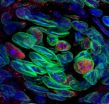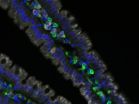(Press-News.org) ST. PAUL, Minn. – Stroke survivors who have an irregular heartbeat called atrial fibrillation may be at higher risk of developing dementia than stroke survivors who do not have the heart condition, according to research published in the March 8, 2011, print issue of Neurology®, the medical journal of the American Academy of Neurology.
Atrial fibrillation affects more than two million Americans, and it is more common as people age. About 15 percent of strokes occur in people with atrial fibrillation. The heart's two upper chambers do not beat effectively in the condition, resulting in an irregular heart rhythm.
The research analyzed all of the available studies where people with atrial fibrillation were compared to people without atrial fibrillation and followed to determine who developed dementia over time.
A total of 15 studies were analyzed, with 46,637 participants with an average age of 72. The research found that stroke survivors with atrial fibrillation were 2.4 times more likely to develop dementia than stroke survivors who did not have the heart condition. About 25 percent of patients with stroke and atrial fibrillation were found to have developed dementia during follow-up.
"These results may help us identify potential treatments that could help delay or even prevent the onset of dementia," said study author Phyo Kyaw Myint, MD, of the University of East Anglia in Norfolk, U.K. "Options could include more rigorous management of cardiovascular risk factors or of atrial fibrillation, particularly in stroke patients."
Myint noted that the research on whether people who have atrial fibrillation but have not had a stroke have any greater risk of dementia was not conclusive.
INFORMATION:
The American Academy of Neurology, an association of more than 22,500 neurologists and neuroscience professionals, is dedicated to promoting the highest quality patient-centered neurologic care. A neurologist is a doctor with specialized training in diagnosing, treating and managing disorders of the brain and nervous system such as Alzheimer's disease, stroke, migraine, multiple sclerosis, brain injury, Parkinson's disease and epilepsy.
For more information about the American Academy of Neurology, visit http://www.aan.com.
VIDEO: http://www.youtube.com/AANChannel
TEXT: http://www.aan.com/press
TWEETS: http://www.twitter.com/AANPublic
Media Contacts:
Rachel Seroka, rseroka@aan.com, (651) 695-2738
Angela Babb, ababb@aan.com, (651) 695-2789
END
The Mediterranean diet has proven beneficial effects not only regarding metabolic syndrome, but also on its individual components including waist circumference, HDL-cholesterol levels, triglycerides levels, blood pressure levels and glucose metabolism, according to a new study published in the March 15, 2011, issue of the Journal of the American College of Cardiology. The study is a meta-analysis, including results of 50 studies on the Mediterranean diet, with an overall studied population of about half a million subjects.
"The prevalence of the metabolic syndrome is ...
San Diego, CA, March 8, 2011 – In the 1960s, a group of U.S. states with high age-adjusted stroke mortality defined a "stroke belt." Until recently, geographic patterns of diabetes had not been specifically characterized in the same manner. In an article published in the April 2011 issue of the American Journal of Preventive Medicine, researchers were able to identify clustered high prevalence areas, or a "diabetes belt" of 644 counties in 15 mostly southeastern states using data compiled for the first time of estimates of the prevalence of diagnosed diabetes for every ...
PHILADELPHIA (March 7, 2011) – A new research study dramatically increases knowledge of how taste cells detect sugars, a key step in developing strategies to limit overconsumption. Scientists from the Monell Center and collaborators have discovered that taste cells have several additional sugar detectors other than the previously known sweet receptor.
"Detecting the sweetness of nutritive sugars is one of the most important tasks of our taste cells," said senior author Robert F. Margolskee, M.D., Ph.D., a molecular neurobiologist at Monell. "Many of us eat too much sugar ...
The intestinal epithelium consists of four main specialized cell lineages: absorptive enterocytes and three secretory cell types known as enteroendocrine, Paneth, and goblet cells. But a rare, fifth type of intestinal cell called tuft cells also exists. Defined by the thick brush of long microvilli that project from their apical surface, tuft cells are seen in several epithelial tissues, yet little is known about their function due to a lack of tuft cell–specific markers.
In the March 7 issue of The Journal of Cell Biology (www.jcb.org), a team of French researchers ...
Patients with Parkinson's disease (PD) suffer a specific loss of dopaminergic neurons from the midbrain region that controls motor function. The exact mechanism of this selective neurodegeneration is unclear, though many lines of evidence point to dysfunctional mitochondrial complex I as one root cause of the disease. Yet new research now suggests that defective regulation of microtubules may be responsible for at least some cases of PD. The study appears in the March 7 issue of The Journal of Cell Biology (www.jcb.org).
Mitochondria were first implicated in PD when ...
The immune system is capable of recognizing tumor growth, and naturally mounts an anti-cancer defense. Dendritic cells (DCs) can take up tumor-derived molecules (antigens) and present them to T cells, and those "primed" T cells are then able to recognize and kill tumor cells. In recent years, researchers have attempted to capitalize upon these natural immune responses to develop new therapies- namely, by generating a pool of tumor antigen-pulsed DCs that might be used as vaccines to augment the T-cell responses of cancer patients. In clinical trials, these DC vaccines have ...
EDITOR'S PICK
Using a molecular switch to turn on cancer vaccines
The immune system is capable of recognizing tumor growth, and naturally mounts an anti-cancer defense. Dendritic cells (DCs) can take up tumor-derived molecules (antigens) and present them to T cells, and those "primed" T cells are then able to recognize and kill tumor cells. In recent years, researchers have attempted to capitalize upon these natural immune responses to develop new therapies- namely, by generating a pool of tumor antigen-pulsed DCs that might be used as vaccines to augment the T-cell responses ...
WINSTON-SALEM, NC – March 7, 2011 – Researchers at the Institute for Regenerative Medicine at Wake Forest University Baptist Medical Center and colleagues reported today on a new advance in tissue engineering. The team is the first in the world to use patients' own cells to build tailor-made urinary tubes and successfully replace damaged tissue.
In an article published Online First by The Lancet, the research team reports replacing damaged segments of urinary tubes (urethras) in five boys. Tests to measure urine flow and tube diameter showed that the engineered tissue ...
The use of media characters on cereal packaging may influence children's opinions about taste, according to a report in the March issue of Archives of Pediatrics & Adolescent Medicine, one of the JAMA/Archives journals.
"The use of trade (e.g. Ronald McDonald) and licensed (e.g. Shrek) spokescharacters is a popular marketing practice in child-directed products because the presence of these figures helps children identify and remember the associated product," the authors write as background information in the article. Because children remember nonverbal representations ...
On International Women's Day (8th March), the European Society of Cardiology (ESC) is calling for action to reduce the gender disparities that are currently resulting in women receiving second rate cardiovascular (CV) care. Studies published online today in the European Heart Journal (EHJ), ¹ ² the official journal of the ESC, show a persistent under-utilisation of guideline recommended treatments for heart disease in women compared to men.
"The ESC wants to raise awareness, among both cardiologists and the public, that women still are not receiving equal access to ...


